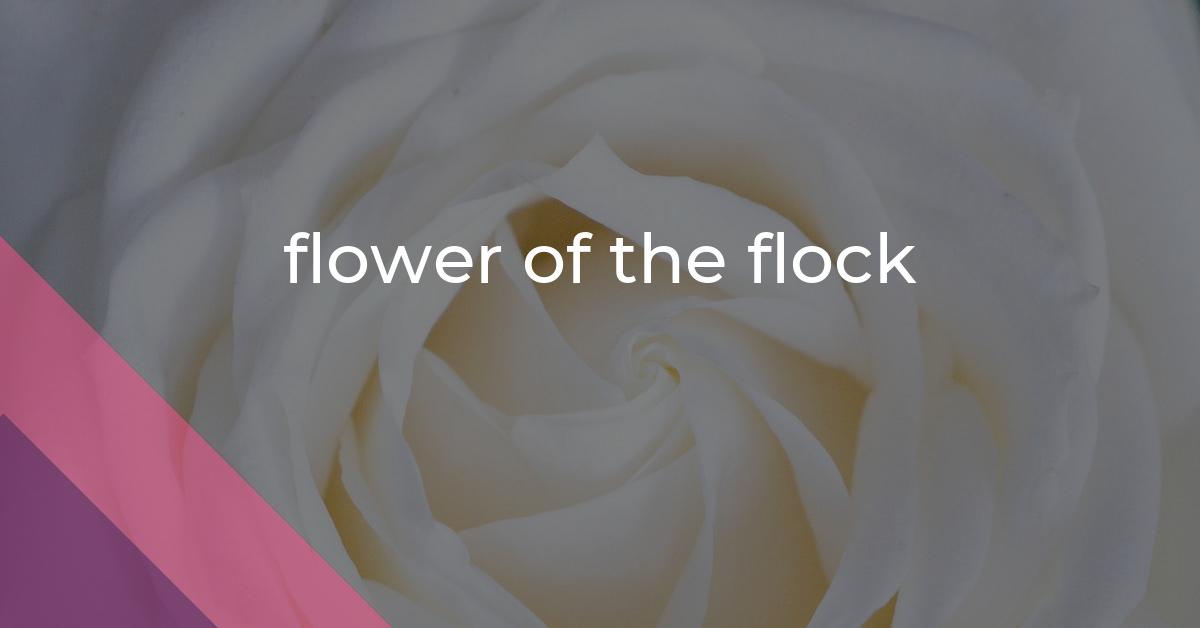flower of the flock: Idiom Meaning and Origin
What does ‘flower of the flock’ mean?
The idiom flower of the flock refers to a person or thing that is considered the best or most valuable among a group. It represents the idea of standing out and being exceptional, like a beautiful flower in a field of plants.

Idiom Explorer
The idiom "pick of the litter" means to choose the best person or thing from a group. It comes from the practice of selecting the best puppy from a litter of newborn dogs.
The idiom "in the flower of one's youth" refers to the period of time when someone is young and at their peak of physical and mental abilities. It implies a sense of beauty, vitality, and freshness commonly associated with flowers.
The idiom "grass tops" refers to the highest level or upper echelons of a particular group or organization, typically consisting of influential or powerful individuals. It symbolizes the idea of reaching the top or pinnacle of success within a specific field or domain.
The idiom "fruit of the union" refers to the positive results or benefits that come as a result of a collaboration or partnership. It symbolizes the outcome or product of a successful union or teamwork.
The idiom "fruit of one's loins" is a metaphor that refers to a person's biological offspring or children.
The idiom "fine feathers make fine birds" means that a person's appearance or external qualities can deceive others into thinking they possess admirable qualities or skills. However, this may not always be the case, as true value lies within a person rather than their outward appearance.
The idiom "feather in one's cap" means to have an achievement or accomplishment that one can be proud of or use to enhance their reputation.
The idiom "feathered friend" refers to a bird, usually kept as a pet or considered as a companion. It suggests that birds are loyal and trustworthy, emphasizing their presence as comforting and friendly creatures.
Decoding Brilliance
The idiom "flower of the flock" is an English expression that has been used since the 16th century. It combines the words "flower," meaning the best or most attractive part, and "flock," referring to a group of sheep or similar animals. The idiom paints a vivid imagery of a standout individual or object that stands out among others, like a beautiful flower amidst a flock of sheep.
When used metaphorically, "flower of the flock" describes someone or something that is considered the best or most exceptional among a group. It implies a sense of distinction, superiority, and uniqueness, similar to how a beautiful flower stands out in a pasture of animals. This idiom is often used to praise individuals who excel in their field, possess exceptional qualities, or exhibit remarkable skills.
The origin of the idiom can be traced back to the biblical story of the Good Shepherd. In this story, Jesus describes himself as the Good Shepherd who knows his sheep and is willing to lay down his life for them. This association of sheep with flock and the notion of a shepherd recognizing a standout member may have influenced the usage of the phrase in English language.
Over time, "flower of the flock" has been used in various contexts, including literature, poetry, and everyday conversation. Its usage can be found in works by famous authors like William Shakespeare, who employed it in his play "Henry VI." In Act 1, Scene 3, the character Richard Plantagenet uses the idiom, stating, "I am the flower of the flock." This usage demonstrates the enduring nature of the idiom throughout history.
Furthermore, the idiom's usage can be found in other languages and cultures, albeit with variations in wording. For example, in French, a similar expression "la crème de la crème" is used, which translates to "the cream of the cream." Both idioms convey a similar sentiment of describing the best among a group.
The idiom "in the flower of one's youth" is another expression that relates to the concept of the "flower of the flock." It describes the prime or most vibrant period of someone's life. This idiom can be used to praise individuals who are at the peak of their physical or mental abilities, similar to how a flower is at its most beautiful and vibrant state when fully bloomed. It signifies a time of energy, vitality, and potential.
Similarly, the idiom "best of the bunch" also shares a connection with the concept of the "flower of the flock." It is used to describe the top or most outstanding member of a group. Just like a flower that stands out among a flock of sheep, the "best of the bunch" is the most exceptional or noteworthy individual in a particular setting. This idiom is commonly used to acknowledge someone's achievements or skills that surpass those of others.
Additionally, the idiom "cream of the crop" is another related expression. It refers to the very best or highest quality among a group. This idiom can be applied to individuals who are considered the elite or top performers in a certain field. It signifies excellence, superiority, and the cream of the crop rising to the top, just like a beautiful flower standing out among a flock of sheep.
The idiom "flower of the flock" has become ingrained in the English language, and its meaning is easily understood by native speakers. It reflects the human tendency to recognize and appreciate exceptional individuals, highlighting the yearning for uniqueness and excellence within society. Despite its enduring usage, the idiom leaves room for interpretation and speculation.
It raises questions about the criteria for being considered the "flower of the flock." What qualities make an individual stand out from the rest? Is it a matter of innate talent, hard work, or a combination of both? These questions remain open-ended and may vary depending on personal perspectives and societal values.
The idiom "flower of the flock" is a metaphorical expression that signifies an exceptional individual or object among a group. Its origins can be traced back to biblical references and its usage can be found in literature throughout history. The idiom's enduring relevance reveals humanity's inclination to recognize and appreciate exceptionalism.
However, the idiom also leaves room for introspection and prompts us to reflect on the qualities that determine the "flower of the flock" within our own lives. Whether it is being in the flower of one's youth, being the best of the bunch, or the cream of the crop, these idioms highlight the desire to stand out and be recognized for our unique qualities and contributions.
Example usage
1. Despite being the youngest player on the team, his remarkable talent and exceptional skills made him the flower of the flock.
2. The documentary showcased the inspiring stories of several individuals who overcame great obstacles to become the flower of the flock in their respective fields.
3. Among the many brilliant students in the graduating class, she was recognized as the flower of the flock for her outstanding academic achievements and leadership qualities.
More "Animals" idioms



